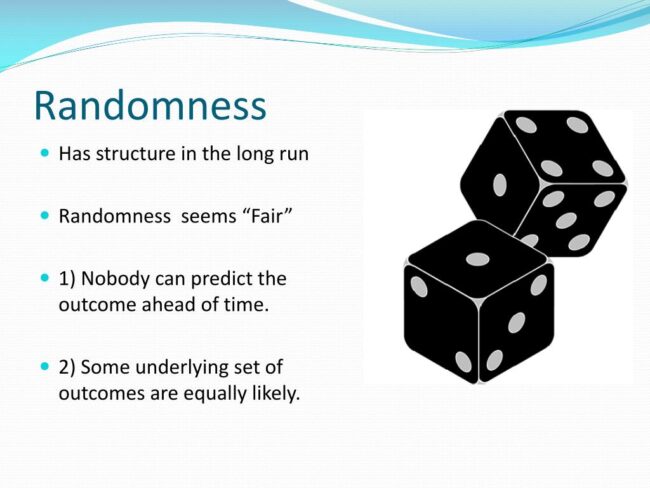The word "random" is often used casually to describe something unpredictable or without order. Yet, the concept of randomness is far more profound an
The word “random” is often used casually to describe something unpredictable or without order. Yet, the concept of randomness is far more profound and fundamental across many disciplines. From physics to computer science, from statistics to everyday life, randomness governs uncertainty, variability, and chance. But what exactly does randomness mean? How do we define it, and why is it so important?
This article explores the nature of randomness, its types, how it is generated, its role in various fields, and why it continues to fascinate researchers and thinkers alike. We’ll also answer frequently asked questions to help clarify common doubts about randomness.
What Is Randomness?
Randomness describes events or outcomes that lack a predictable pattern or cause. A random event cannot be determined in advance, even if all relevant conditions are known. For instance, if you toss a fair coin, the result—heads or tails—is random because each outcome is equally probable and unpredictable.
In contrast, deterministic events follow specific laws or rules where future outcomes can be exactly predicted if the initial state is known. Randomness introduces uncertainty and variability, making it a key feature of complex and natural systems.
Types of Randomness
1. True Randomness
True randomness originates from processes that are inherently unpredictable and not influenced by hidden variables or initial conditions. Examples include radioactive decay, thermal noise in circuits, and quantum phenomena like photon polarization. True random events cannot be predicted or reproduced, no matter how much information is available.
2. Pseudo-Randomness
Pseudo-randomness is generated by deterministic algorithms designed to simulate random behavior. Computers produce pseudo-random numbers by starting from a “seed” value and applying mathematical formulas. These sequences appear random but are actually fully determined by their initial seed. If you know the seed, you can reproduce the sequence exactly. Pseudo-randomness is sufficient for many applications but is distinct from true randomness.
How Is Randomness Generated?
Physical Sources
True randomness is derived from physical processes that are naturally unpredictable. Common sources include:
- Radioactive decay: The exact moment a nucleus decays is random.
- Thermal noise: Random electron movement causes electrical noise.
- Atmospheric noise: Variations in the atmosphere produce random signals.
- Quantum events: Particle behavior at the quantum scale is fundamentally probabilistic.
Algorithmic Sources
Computers use algorithms called pseudo-random number generators (PRNGs) that produce long sequences of numbers that appear random but are deterministic. They are widely used in simulations, cryptography, and gaming where true randomness is difficult to obtain.
Randomness in Science
Probability and Statistics
Randomness is the foundation of probability theory, which models uncertainty mathematically. Statistical methods use random sampling to make inferences about populations and reduce bias.
Physics
Quantum mechanics revolutionized physics by showing that randomness is fundamental at microscopic scales. The behavior of particles can only be predicted probabilistically, not deterministically.
Biology
Random genetic mutations introduce variability that drives evolution. Random processes also underlie neural activity and other complex biological systems.
Computer Science
Randomness improves algorithms and data security. Randomized algorithms can be more efficient or simpler, and random keys keep digital communication secure.

Randomness in Everyday Life
- Games: Dice rolls, card shuffles, and lotteries depend on randomness.
- Decision Making: People often use random methods like coin flips for unbiased choices.
- Traffic Flow: Modeling vehicle arrivals as random events helps optimize traffic signals.
- Health: Random mutations affect disease progression and treatment responses.
Measuring and Testing Randomness
Measuring randomness is challenging. Some approaches include:
- Statistical tests: Checking sequences for patterns or biases.
- Entropy: Quantifies unpredictability in information theory.
- Algorithmic complexity: Measures how compressible a sequence is; random sequences cannot be compressed significantly.
The Philosophical Side of Randomness
The existence of randomness raises big questions:
- Is the universe deterministic or fundamentally random?
- Can randomness and free will coexist?
- Is randomness just a reflection of incomplete knowledge?
These debates continue across physics, philosophy, and metaphysics.
Practical Applications of Randomness
- Cryptography: Random keys protect privacy and data.
- Simulations: Random sampling allows realistic modeling of complex systems.
- Machine Learning: Randomness helps train algorithms and avoid overfitting.
- Art and Creativity: Random elements inspire novel ideas and designs.
Frequently Asked Questions (FAQs) About Randomness
Q1: Is randomness the same as chaos?
No. Chaos theory studies deterministic systems highly sensitive to initial conditions, which appear random but are predictable in principle. True randomness is inherently unpredictable.
Q2: Can true randomness be created artificially?
Not entirely. Artificial systems produce pseudo-randomness, but true randomness comes from natural physical phenomena.
Q3: Why is randomness important in encryption?
Randomness ensures keys are unpredictable, which makes encryption secure against attacks.
Q4: How do scientists test if a sequence is random?
They use statistical tests to detect patterns, frequency distributions, and correlations that deviate from randomness.
Q5: Does randomness exist in the universe?
Yes, especially at the quantum level, many phenomena are intrinsically random.
Q6: Can randomness improve computer algorithms?
Yes, randomness can speed up computations and help avoid predictable patterns.
Q7: Is randomness related to luck?
Randomness underlies the concept of luck, which is an interpretation of random favorable or unfavorable events.
Q8: How do random mutations affect evolution?
Random mutations introduce genetic variation, which natural selection acts upon to evolve species.
Q9: Can randomness be predicted or controlled?
True randomness cannot be predicted or controlled, but its effects can be managed statistically.
Q10: What is a pseudo-random number generator (PRNG)?
A PRNG is an algorithm that generates sequences of numbers that appear random but are actually deterministic.
Randomness is a complex and multifaceted concept that shapes many parts of our world—from the smallest quantum particles to large-scale natural systems, from digital security to everyday decisions. Understanding randomness helps us grasp the nature of uncertainty and complexity in life.
If you want to explore randomness further or have specific questions, feel free to ask!
More Info: quickcashhub

COMMENTS